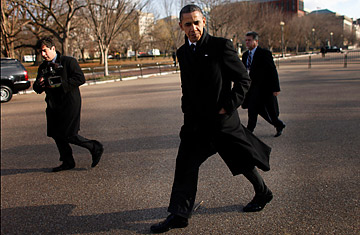
President Barack Obama walks across Pennsylvania Avenue to the Blair House
President Obama will host nearly two dozen CEOs at a Washington conference Wednesday, Dec. 15, intended to repair his relations with business and to tout his new tax-cut deal.
This morning's meeting at Blair House is the latest in a series of lunches and dinners the Obama Administration has hosted for top executives, but the events have never produced the close political alliance with business that White House aides once imagined. Instead, CEOs have long complained that Obama and his aides have been too stridently antibusiness in their remarks, if not their policymaking, and today's meetings are an effort to reverse that.
The mistrust has many roots; it stems partly from the Administration's health care reform law and partly from the Administration's general tone in remarks about the business community. Early last year, Obama barred lobbyists from the White House, although representatives from trade organizations regularly conduct business with various Administration officials, especially at the regulatory agencies. Business's concerns have heightened since the departure of Larry Summers as head of the President's National Economic Council. Summers was one of the few Obama aides who spoke the same dialect as Wall Street, and White House officials haven't named a replacement. The banking community, meanwhile, is still smarting over Obama's appointment of Elizabeth Warren, a former Harvard Law School professor, to establish the Consumer Financial Protection Bureau. "What we're looking for now is progress on some specific policies that you can take to the bank," says Johanna Schneider, executive director of the Business Roundtable, a Washington-based trade group representing CEOs of some of the nation's largest companies. During the short walk from the White House to the Blair House, Obama told reporters this morning, "The most important question about an economic idea is not whether it's good short-term politics or meets somebody's litmus test. It's whether it will help spur business, jobs and growth."
Billed as a "working session," today's event will include Kenneth Chenault of American Express, Jeffrey Immelt of General Electric, Indra Nooyi of PepsiCo and Eric Schmidt of Google. On Tuesday, Dec. 14, Obama met with Microsoft's Bill Gates and the investor Warren Buffett. Many of these CEOs are veterans of Obama's team. Immelt, for instance, serves on the Administration's Economic Advisory Board. The CEO of communications giant Comcast, Brian Roberts, last December endorsed Democrats' health care reform package. UBS Americas CEO Robert Wolf contributed to Obama's presidential campaign (and to Hillary Clinton's), according to the nonpartisan Center for Responsive Politics. And Penny Pritzker, a billionaire Chicago socialite who is chairman of Pritzker Realty Group, was a top Obama campaign fundraiser.
Obama is expected to spotlight his new Republican-backed tax-cut deal in the Blair House sessions. Many within the business community believe the tax deal, which generally extends through 2012, doesn't take a long-enough view, but by and large the reaction has been positive, since the cuts amount to a second stimulus to an economy that is still growing slowly. The Senate is expected to vote on the measure Wednesday.
Trade remains a tougher issue. Obama's own party is against trade deals, while business lobbies depend on them. Obama's visit to Asia last month was partly intended to move the needle on a free-trade agreement with South Korea, the world's 15th largest economy and America's seventh largest trading partner. The U.S. has been slow to execute trade deals with emerging markets like Colombia, Panama and Russia at a time when the European Union and Canada are moving quickly to do so, in the process enabling their companies to build supply networks and be competitive. Because of the trade barrier with South Korea, for example, the U.S. auto industry is at a disadvantage; there's only a single Ford dealership in South Korea, vs. about 1,500 dealerships for South Korean–owned auto companies in the U.S. "That's a big deal to American business," says Bruce Josten, the top lobbyist at the U.S. Chamber of Commerce. He adds, "The business community is tired of pep talks on trade. Other countries are racing ahead on crafting trade deals, and we're standing still, which means you're falling behind and ceding market."
